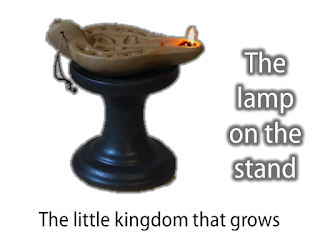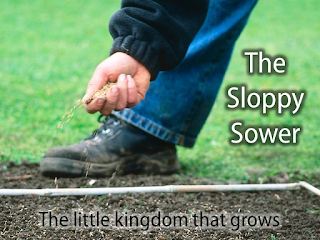Hespeler, 10 September, 2017 © Scott McAndless
Mark 4:21-25, 2 Timothy 1:6-12, Psalm 78:1-8
| M |
any years ago, I spent a summer in the state of Kerala in South India where we spent a fair bit of time way out in the hill country far from any cities of any size. We stayed with some local people – members of a local Christian church – and it was a very eye opening experience. The region is relatively well-off compared to many areas in India, but it certainly seemed, to our western eyes, as if there were many people living in great poverty. Indoor plumbing was rare. The water was mostly unsafe to drink and, while there was electricity, it was very unreliable and would go off for long periods of time.
For a while, we stayed in a simple farm on some rice fields. At night when the electricity was out, it got incredibly dark. We didn’t have flashlights (we hadn’t thought we would need them) so when we had to go anywhere at night (like, for example, to the bathroom which was in the field) we would generally take a candle with us. And I learned a few things on those nighttime walks that have very much stayed with me ever since.
My first lesson might seem a little bit obvious, but I think that it needs to be said. The first thing that I learned while heading out over unknown and uneven fields in the pitch dark was that a lit candle was extremely valuable. The difference between going out there with a candle and going without one might mean getting completely lost, maybe falling and twisting an ankle or falling into an irrigation canal. At that moment, nothi
The second lesson was a bit of a surprise to me. When we went out into those fields, our first instinct was to do what you might do with a flashlight or like what you see in an old movie where someone carries a candle. You want to hold the candle up right in front of you like this. I learned very quickly that that did not work at all.
The problem with doing that is obvious if you think about it. If you hold the candle in front of you, that means that all you can see is the flame. Everything else is completely dark and, in comparison, the flame is impossibly bright. Your night vision is completely ruined by the light in your eyes and you cannot see anything else. So you very quickly learn that you have to make sure that the candle shines anywhere but towards your eyes. One way to do that was to hold the candle up over your head or to the side so you were looking away from it.
But my favourite solution was the one that was shown to me by the people who lived there. You would pick up a broken coconut shell (they were everywhere) and hold it over the candle between you and where you were going. The locals called it a “Kerala lamp.” It worked really well and had the added advantage of blocking the wind somewhat from blowing out your candle.
Now, if you had lived centuries ago – before electricity and at a time when candles and lamps were rare and expensive and difficult to light because there weren’t even any matches, you would probably know everything that I had to learn about walking with a candle at night. But you and I have lived all our lives in a very different world. We may have used candles and even oil lamps before, but because we have always lived in a world where you don’t usually have to depend on such things to actually find your way in the dark, there is a sense in which we don’t actually know how they work even though we may think we do.
That means that, when we hear Jesus talk about lamps and what to do with them, it may not be quite as obvious to us what Jesus meant by what he said as it was to the people who first heard him say it and who never saw an electric light in their life.
For example, when Jesus said, “Is a lamp brought in to be put under the bushel basket, or under the bed, and not on the lampstand?” They would have immediately understood how important a lamp could be. These were people who lived almost half their lives in the light and the other half almost completely in darkness. When the sun came up in the morning, they began to live and work. But when the sun went down their world went completely dark. Yes, they had lamps, but every moment they kept a lamp lit meant burning precious oil that represented many hours of labour growing, picking and pressing olives. It was also oil that, if it wasn’t burned up, represented an essential part of their diet. Every ounce of oil burned was oil that could not be eaten. So you can be sure that these people did not light their lamps lightly or without reason.
Light in the darkness – something that we pretty much take for granted – was something extraordinarily precious and rare to them. And when Jesus started talking to them in a parable about lamps and what to do with them, they would have immediately assumed that he was talking about something very precious and rare.
The thing that Jesus was comparing to a lamp, I think it is clear when you look at the whole context in the Gospel of Mark, was the good news message of the kingdom of God – the message of God’s grace and love and what we do in response to that message. So the people who heard him talk about this lamp would have understood that to receive the message of the gospel was a precious and rare gift.
I wonder how much we recognize how very valuable the knowledge of that message is. We have been told certain things about God and how God deals with humanity. We have been shown, in the person of Jesus Christ, that the power of love is able to overcome the greatest and darkest powers in this world. Do you realize how many people in our society today have no access to such good news – who are simply living out their existence with no reason to hope that anything might ever change in this world?
Now, I am not one to go around saying that we, as Presbyterian Christians, have exclusive access to these truths. I tend to believe that they are truths that God reveals to various people in various ways in our world and that people can perhaps even come to them by various paths and even through different faiths. But I would definitely agree with the sentiment of our reading this morning from the letter to Timothy: “Do not be ashamed, then, of the testimony about our Lord.” We have received a testimony about the God revealed by Jesus Christ that we should not hesitate to be proud of. It is a message that has the power to change lives for the good – even to transform the world. That is the light that we are talking about in this passage.
So the question now becomes, if we have this light, what do we do with it. Jesus says, “Is a lamp brought in to be put under the bushel basket, or under the bed, and not on the lampstand?” Now the very idea of lighting a lamp and then hiding it underneath a basket or a bed is perfectly ridiculous and Jesus knows it. First of all, there is a practical problem that if you put your burning lamp underneath a woven basket you will probably catch the thing on fire and end up burning your house down. But, even more than that, what would be the point of lighting a lamp, burning up your precious oil, and then not even allowing it to shine on anything? It would be a stupid waste of resources.
So what does Jesus mean when he says that you would never do such foolish things? What is he trying to say about the message of the good news about God? That brings me to the second lesson I learned wandering around the pitch black hills of Kerala in South India with nothing but a candle to guide me. I learned that a candle you hold out in front of you as you walk is as good as useless. In the blackness, if you can see the flame of your lamp, you cannot see anything else. In other words, the candle is only really helpful if it shines on other things and people, not directly on you.
I believe that this was the truth Jesus was trying to get at by talking about hiding your lamp once you had lit it. He was pointing out the simple fact that the only reason you would light a lamp was if you were going to let it shine on something. It needed to shine on your book or on your path or on the thing that you were working on or there was simply no point in lighting it at all and it was merely a waste.
What that means in terms of the church and that whole task of being the light of the world is that this incredible message that we have of God’s grace and love and renewal needs to shine on something other than us or we will be guilty of squandering and wasting it.
But let me ask you, how do we usually let the light shine in the life of the church? Most often, I would suggest to you, we do it like I held up the candle the first time I went out walking in the rice fields at night. We hold it up right in front of us. We see this amazing light, we celebrate and worship God for it, and we revel in how God has loved us and saved us and given us reason to hope.
All of that is well and good as far as it goes but there is a problem. So long as you are holding up that light before your own eyes, it is all that you can see. You blind yourself to everything but that light. You cannot see, for example, the struggles that other people are going through, you cannot see the injustices that they have to deal with. And that is precisely the problem that we seem to run into far too often in the church today – the suffering that people outside of the church go through becomes invisible to us. I think that that is what Jesus means when he talks about putting your light under a basket – it means shining the light in a way that it really only shines for your own sake.
What does it mean for us to be the light of the world in the church? It means that we are not meant to keep this light – this message – to ourselves. Instead of shining it in our own eyes, we must hold it up above our heads so our eyes are not on the light but on the world that God so loved. And when we are tempted to keep it only for ourselves and use it only to serve ourselves, we must grab hold of a coconut shell, and set it between us and the light forcing ourselves to look elsewhere. The coconut shell is the example of Christ who came to live the message of life, not for his own sake but so clearly for the sake of everyone else that he laid his own life down in its service.
As you go out into the world following the service today, therefore, I would invite you to take with you the light of the knowledge of Christ that you have obtained in this church and throughout your Christian life. But carry it like this – like a Kerala lamp – so that you may allow the love and grace, forgiveness and hope of Christ to shine on others before it shines on yourself. I’ll warn you, that may mean that you find yourself thinking about the needs of others before you think of your own needs, that you may spend more energy on compassion than you do on judgement and that you may feel more deeply the struggles of others that you observe. In other words, you might just become more Christlike.









